Class 12 English Chapter 3.3 Note-Making Question Answer Maharashtra Board
Balbharti Yuvakbharati English 12th Digest Chapter 3.3 Note-Making Notes, Textbook Exercise Important Questions and Answers.
12th Std English Chapter 3.3 Brainstorming Question Answer
12th English Digest Chapter 3.3 Note-Making Textbook Questions and Answers
Question 1.
Complete the web.
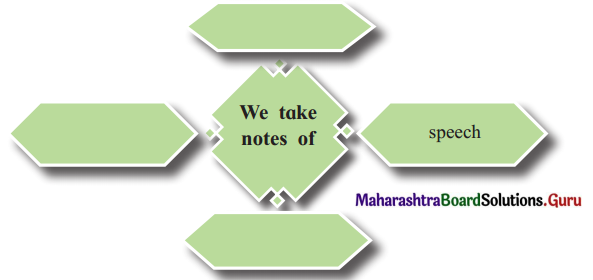
Answer:
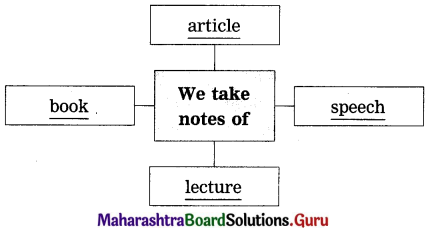
![]()
Question 2.
Discuss in groups why you take notes.
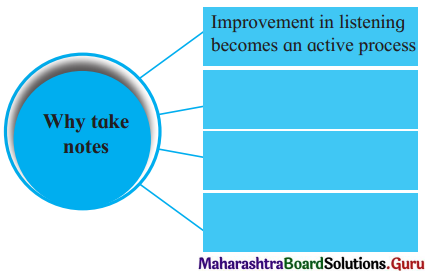
Answer:
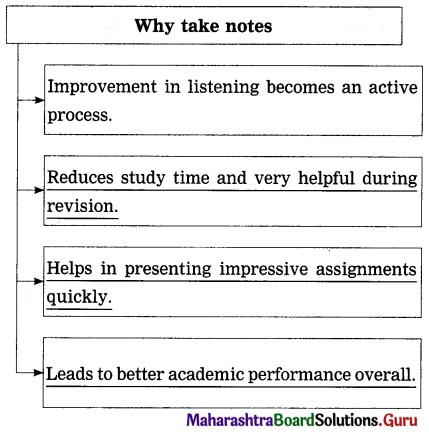
Better notes will help you remember concepts, develop meaningful learning skills and gain better understanding of a topic. Discuss in groups different styles or methods you use in your note-making/taking. For example, to underlining iportant facts.
(We have given here a few of the methods employed in Note-making/Note-taking in blank formats. Students may experiment and find out the most useful method/ methods on their own. The selection of method largely depends upon the personal trait, taste and talent of j each individual student.)
Question 3.
Now let’s complete the following diagram that represents Prana and its elements: (The answers are given directly. For the relevant article, refer to page 149 of the textbook.)
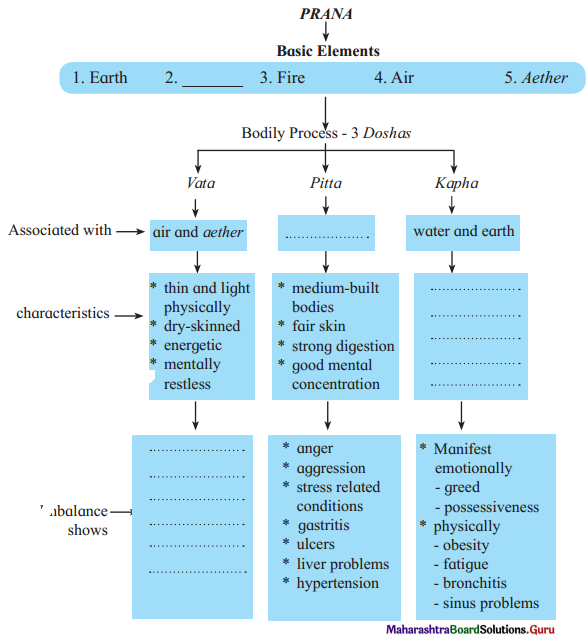
Answer:
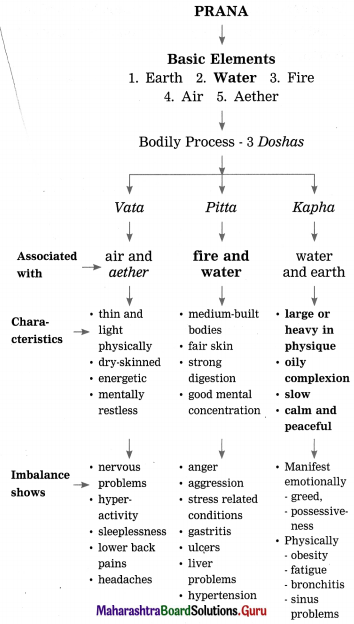
Example: Transfer the above information in the form of a table:
(Answers are given directly and underlined)
Bodily process
| Doshas | Associated with | Characteristics | Imbalance causes |
| Vata | air and aether | energetic | nervous |
| Pitta | fire and water | strong digestion | aggression |
| Kapha | water and earth | slow | greed |
![]()
(A1)
Question 1.
Read the following passage carefully and complete the activities.
(A2)
Question 1.
Read the passage given on page 151 of the textbook and complete the following points with the help of the above text. (Give a suitable title.)
The Perils of self-medication
Answer:
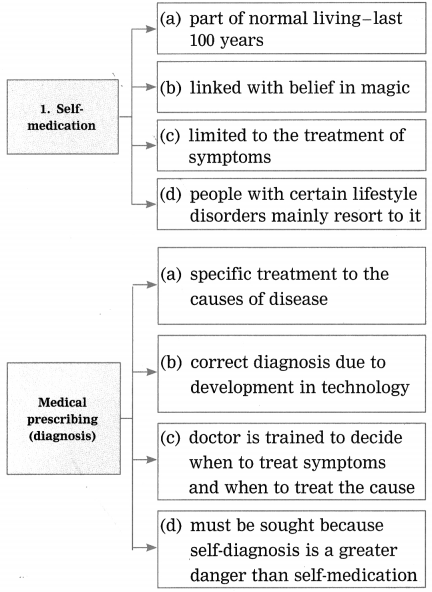
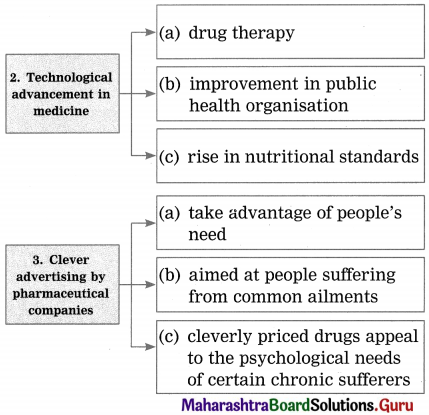
Yuvakbharati English 12th Digest Chapter 3.3 Note-Making Additional Important Questions and Answers
Question 1.
Cornell Two-column notes
Answer:
(Blank format)
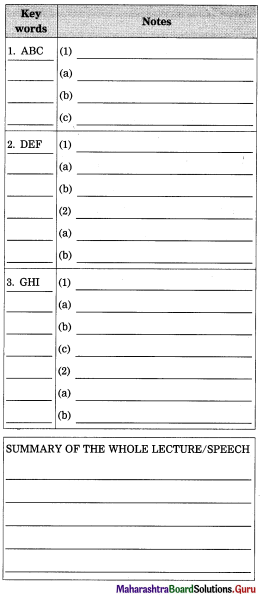
![]()
Outlining method:
Question 1.
In Outlining method, you put the main idea/topic closest to the left side of your page as headers. Then use indentations (i.e. to leave space as if you begin a new paragraph and moving to the right each time) to arrange the related points one after the other.
Blank format:
Keyword:
• This is the main division.
• This is a sub-division.
• This is a supporting fact.
Keyword :
• This is the main topic.
• This is a sub-topic.
• This is an argument in support.
Box and Bullet method:
In this, a box is drawn for every main idea. Under each box are supporting points written against bullet points.
Blank format:
Title:
Author:
Central idea -1
______________
______________
______________
Central idea – 2
______________
______________
______________
Question 2.
Table:
Answer:
| Term | Meaning | Additional information |
| Tax avoidance | Arranging one’s financial affairs to reduce tax | It is legal. |
| Tax evasion | Filing false returns or failing to file returns | It is illegal. It is a punishable offence. |
| Taxable income | Part of income that is liable to tax. | Can be reduced by allowing deductions. |
| Tax assessment | Determination of the amount of tax | Tax payers file returns. |
![]()
Pie Chart:
Question 1.
Pie Chart showing the land use in India.
Answer:
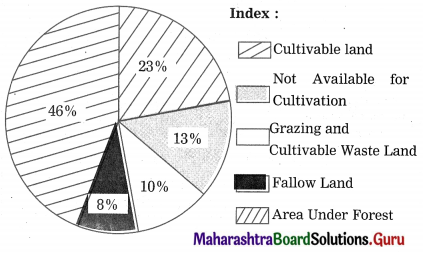
Bar Graph:
Question 1.
Bar Graph showing the Organ Donation Pattern in India (By a Study Group)
Answer:
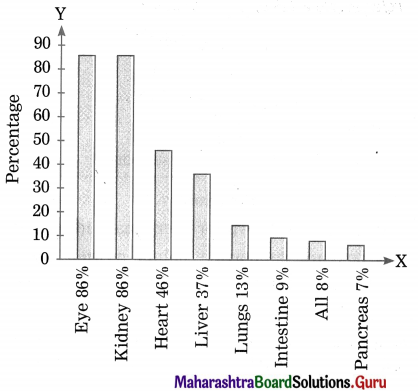
![]()
Line Graph:
Question 1.
Line Graph showing the price of motorbikes and the corresponding sales
Answer:
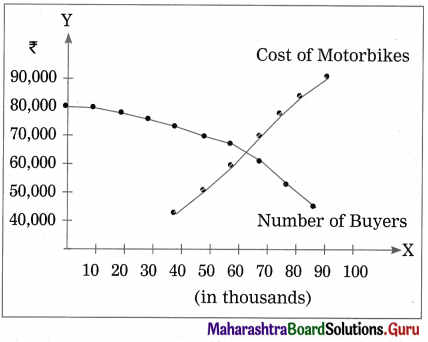
Conclusion:
Organizing the notes is an essential component of Note-making or Note-taking. Students must remember that the ‘notes’ are for further use. If you fail to make any sense of your ‘notes’ later, the very purpose of Note-taking and Note-making is defeated. So the use of proper headings and sub-headings are very important. You must judiciously use numbers and letters for the sub-topics and derived points. Underlining and using an asterisk (*) will help you to identify the main points at a glance. Above all, the method and style of Note-taking/Note-making should be in tune with your personal propensity of ordering things.
Yuvakbharati English 12th Digest Guide Section 3 (Writing Skills)